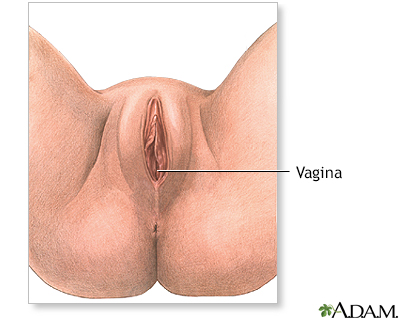Pregnancy SmartSiteTM
Cancer - vulva; Cancer - perineum; Cancer - vulvar; Genital warts - vulvar cancer; HPV - vulvar cancer DefinitionVulvar cancer is cancer that starts in the vulva. Vulvar cancer most often affects the labia, the folds of skin outside the vagina. In some cases, vulvar cancer starts on the clitoris or in glands on the sides of the vaginal opening. CausesMost vulvar cancers begin in skin cells called squamous cells. Other types of cancers found on the vulva are:
Vulvar cancer is rare. Risk factors include:
Women with a condition called vulvar intraepithelial neoplasia (VIN) may develop into a vulvar cancer that spreads. Most cases of VIN, though, never lead to cancer. Other possible risk factors may include:
SymptomsWomen with this condition will often have itching around the vagina for years. They may have used different skin creams. They may also have bleeding or discharge outside their periods. Other skin changes that may occur around the vulva:
Other symptoms:
Some women with vulvar cancer have no symptoms. Exams and TestsThe following tests are used to diagnose vulvar cancer:
TreatmentTreatment involves surgery to remove the cancer cells. If the tumor is large (more than 2 cm) or has grown into the skin, the lymph nodes in the groin area may also be removed. Radiation, with or without chemotherapy, may be used to treat:
Support GroupsYou can ease the stress of illness by joining a cancer support group. Sharing with others who have common experiences and problems can help you not feel alone. Outlook (Prognosis)Most women with vulvar cancer who are diagnosed and treated at an early stage do well. But a woman's outcome depends on:
The cancer commonly comes back at or near the site of the original tumor. Possible ComplicationsComplications may include:
When to Contact a Medical ProfessionalContact your health care provider if you have any of these symptoms for more than 2 weeks:
PreventionPracticing safer sex may decrease your risk for vulvar cancer. This includes using condoms to protect against sexually transmitted infections (STIs). A vaccine is available to protect against certain forms of HPV infection. The vaccine is approved to prevent cervical cancer and genital warts. It may help prevent other cancers linked to HPV, such as vulvar cancer. The vaccine is given to young girls before they become sexually active, and to adolescents and women up to age 45. Routine pelvic exams can help detect vulvar cancer at an earlier stage. Earlier diagnosis improves your chances that treatment will be successful. ReferencesFrumovitz M. Neoplastic diseases of the vulva and vagina. In: Gershenson DM, Lentz GM, Valea FA, Lobo RA, eds. Comprehensive Gynecology. 8th ed. Philadelphia, PA: Elsevier; 2022:chap 30. Jhingran A, Russell AH, Seiden MV, et al. Cancers of the cervix, vulva, and vagina. In: Niederhuber JE, Armitage JO, Kastan MB, Doroshow JH, Tepper JE, eds. Abeloff's Clinical Oncology. 6th ed. Philadelphia, PA: Elsevier; 2020:chap 84. National Comprehensive Cancer Network website. NCCN Clinical Practice Guidelines in Oncology (NCCN Guidelines). Vulvar cancer (squamous cell cardinoma) Version 4.2024 – May 1, 2024. www.nccn.org/professionals/physician_gls/pdf/vulvar.pdf. Accessed June 15, 2024. National Cancer Institute website. Vulvar cancer treatment (PDQ) - health professional version. www.cancer.gov/types/vulvar/hp/vulvar-treatment-pdq. Updated February 16, 2024. Accessed June 10, 2024. | ||
| ||
Review Date: 3/31/2024 Reviewed By: Howard Goodman, MD, Gynecologic Oncology, Florida Cancer Specialists & Research Institute, West Palm Beach, FL. Review provided by VeriMed Healthcare Network. Also reviewed by David C. Dugdale, MD, Medical Director, Brenda Conaway, Editorial Director, and the A.D.A.M. Editorial team. View References The information provided herein should not be used during any medical emergency or for the diagnosis or treatment of any medical condition. A licensed medical professional should be consulted for diagnosis and treatment of any and all medical conditions. Links to other sites are provided for information only -- they do not constitute endorsements of those other sites. No warranty of any kind, either expressed or implied, is made as to the accuracy, reliability, timeliness, or correctness of any translations made by a third-party service of the information provided herein into any other language. © 1997- A.D.A.M., a business unit of Ebix, Inc. Any duplication or distribution of the information contained herein is strictly prohibited. | ||


 Female perineal an...
Female perineal an...
